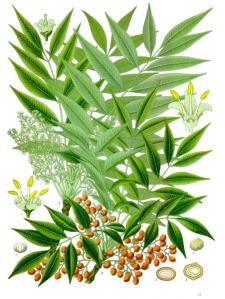Difference between revisions of "Sumac"
| Line 11: | Line 11: | ||
<p> </p> | <p> </p> | ||
| − | Sumac is | + | Sumac is a versatile plant native to the Mediterranean region and Central Asia. It can reach the size of a small tree at a height of 1-3 metres and is characterized by soft, deep green leaves. These contain urushiol, which usually leads to prolonged allergic skin irritations. Only 15 to 30% of all humans are immune to this substance, while 25% of the world's population is particularly sensitive to urushiol. The flowers are yellow-green and the fruits orange-red. |
| − | Tannins from the leaves of the sumac are used | + | Tannins from the leaves of the sumac are used in [[leather production]]. Its tannin content is 13 to 28%. The bark can be used as a colouring agent for textiles and wool, while the dried, ripe fruits of the plant (the immature fruits are poisonous) are processed as a sour spice for Arabian and Iranian dishes. |
Revision as of 13:57, 27 April 2017
The sumac plant.
Sumac is a versatile plant native to the Mediterranean region and Central Asia. It can reach the size of a small tree at a height of 1-3 metres and is characterized by soft, deep green leaves. These contain urushiol, which usually leads to prolonged allergic skin irritations. Only 15 to 30% of all humans are immune to this substance, while 25% of the world's population is particularly sensitive to urushiol. The flowers are yellow-green and the fruits orange-red.
Tannins from the leaves of the sumac are used in leather production. Its tannin content is 13 to 28%. The bark can be used as a colouring agent for textiles and wool, while the dried, ripe fruits of the plant (the immature fruits are poisonous) are processed as a sour spice for Arabian and Iranian dishes.
Additional information









 a kotori web solution
a kotori web solution